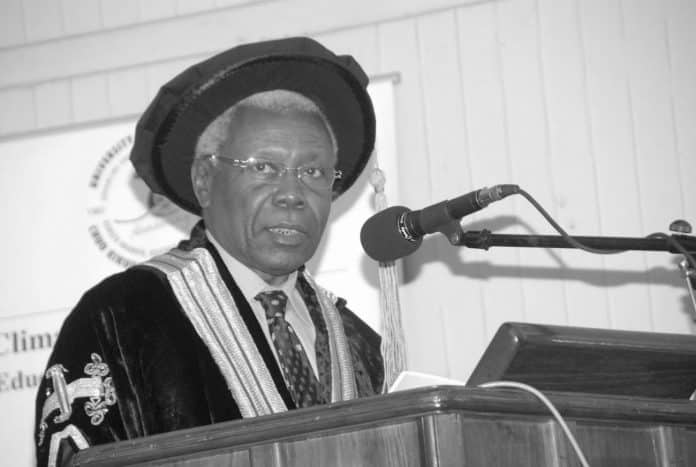Introduction to Nelson Mandela African Institute of Science and Technology
The Nelson Mandela African Institute of Science and Technology (NM-AIST) is a premier institution of higher learning located in Arusha, Tanzania. Established in 2011, the institute has quickly become a hub for cutting-edge research and innovation in Africa, attracting some of the brightest minds from across the continent and beyond.
At the heart of NM-AIST’s success is the visionary leadership of Professor Mohamed Gharib Bilal, the institute’s Vice Chancellor. With his unwavering commitment to excellence and his deep understanding of the unique challenges facing African nations, Professor Bilal has spearheaded the institute’s rapid growth and transformation, positioning it as a global leader in science, technology, and sustainable development.
Mohamed Gharib Bilal: An Overview of His Achievements and Role at the Institute
Professor Mohamed Gharib Bilal is a renowned scholar and respected leader in the field of engineering and technology. With a Ph.D. in Mechanical Engineering from the University of Wisconsin-Madison, he has dedicated his career to advancing scientific research and promoting sustainable development in Africa.
Prior to joining NM-AIST, Professor Bilal held prestigious positions at several leading institutions, including the University of Dar es Salaam, where he served as the Dean of the Faculty of Engineering. His extensive experience and expertise have been instrumental in shaping the vision and mission of the Nelson Mandela African Institute of Science and Technology.

As the Vice Chancellor of NM-AIST, Professor Bilal has been the driving force behind the institute’s remarkable growth and achievements. Under his leadership, the institute has established itself as a premier destination for students and researchers from across Africa and around the world, attracting top talent and fostering groundbreaking research.
The Vision and Mission of the Nelson Mandela African Institute of Science and Technology
The Nelson Mandela African Institute of Science and Technology is guided by a clear and ambitious vision: to become a world-class center of excellence in science, technology, and innovation, with a focus on addressing the unique challenges facing the African continent.
The institute’s mission is to provide high-quality education, conduct cutting-edge research, and foster innovation that directly contributes to the sustainable development of Africa. This is achieved through a multidisciplinary approach that combines the expertise of faculty, researchers, and students from diverse backgrounds, working collaboratively to tackle complex problems.
At the heart of NM-AIST’s mission is a deep commitment to empowering the next generation of African leaders and problem-solvers. By offering world-class academic programs, state-of-the-art facilities, and ample research opportunities, the institute is nurturing a new generation of scientists, engineers, and innovators who are poised to drive positive change in their communities and across the continent.
The Impact of the Institute on Scientific Research and Innovation in Africa
Since its inception, the Nelson Mandela African Institute of Science and Technology has had a profound impact on the landscape of scientific research and innovation in Africa. Through its cutting-edge research programs, the institute has made significant contributions to a wide range of fields, including:
- Sustainable Agriculture and Food Security: Researchers at NM-AIST are developing innovative solutions to address the challenges of food production, distribution, and storage, with a focus on improving the livelihoods of smallholder farmers and ensuring food security for communities across the continent.
- Renewable Energy and Environmental Sustainability: The institute’s researchers are at the forefront of renewable energy research, exploring new technologies and strategies for harnessing clean, sustainable power sources to meet the growing energy demands of African nations.
- Public Health and Disease Prevention: NM-AIST scientists are working to tackle pressing public health issues, such as the prevention and treatment of infectious diseases, the development of affordable medical technologies, and the promotion of healthy living practices.
- Information and Communication Technologies (ICT): The institute’s expertise in computer science, data analytics, and digital technologies is driving the development of innovative solutions to address challenges in areas like e-governance, digital education, and smart city planning.
Through these and other research initiatives, NM-AIST has established itself as a leading hub for scientific innovation in Africa, attracting researchers, students, and collaborators from around the world to work together in addressing the continent’s most pressing challenges.
Facilities and Resources Available at the Nelson Mandela African Institute of Science and Technology
The Nelson Mandela African Institute of Science and Technology is equipped with state-of-the-art facilities and resources that support its mission of excellence in research, education, and innovation. Some of the key facilities and resources available at the institute include:
- Advanced Laboratories and Research Centers: NM-AIST boasts a range of specialized laboratories and research centers, covering areas such as biotechnology, materials science, energy systems, and information and communication technologies. These facilities are equipped with cutting-edge equipment and technologies, enabling researchers to conduct groundbreaking experiments and develop innovative solutions.
- Comprehensive Library and Digital Resources: The institute’s library and digital resource center provide students and researchers with access to a vast collection of academic journals, books, and online databases, ensuring they have the necessary tools to stay up-to-date with the latest developments in their fields of study.
- Collaborative Spaces and Innovation Hubs: NM-AIST encourages interdisciplinary collaboration and fosters a culture of innovation through its dedicated collaborative spaces and innovation hubs. These spaces serve as incubators for new ideas, where students, researchers, and industry partners can come together to brainstorm, prototype, and transform their ideas into tangible solutions.
- Residential and Recreational Facilities: To support the holistic development of its students, NM-AIST offers a range of residential and recreational facilities, including student dormitories, sports facilities, and social spaces, creating a vibrant and engaging campus environment.
- Technological Infrastructure: The institute’s robust technological infrastructure, including high-speed internet connectivity, advanced computing resources, and cutting-edge communication systems, enables seamless collaboration, data sharing, and remote access to resources, ensuring that researchers and students can work effectively and efficiently.
These state-of-the-art facilities and resources, combined with the institute’s commitment to excellence, have made NM-AIST a premier destination for students and researchers seeking to advance their knowledge and contribute to the development of Africa.
Collaborations and Partnerships with Other Institutions and Organizations
The Nelson Mandela African Institute of Science and Technology has established a strong network of collaborations and partnerships with leading institutions and organizations, both within Africa and globally. These partnerships have been instrumental in enhancing the institute’s research capabilities, expanding its academic offerings, and fostering cross-cultural exchange and knowledge sharing.
Some of the key collaborations and partnerships include:
- International Universities and Research Institutes: NM-AIST has forged partnerships with renowned universities and research centers around the world, such as the Massachusetts Institute of Technology (MIT), the University of Cambridge, and the University of California, Berkeley. These collaborations facilitate joint research projects, student and faculty exchanges, and the sharing of best practices in higher education.
- African Institutions: The institute has established strong ties with other leading universities and research centers across Africa, including the University of Dar es Salaam, the University of Nairobi, and the University of Ghana. These regional partnerships enable the sharing of resources, the development of joint academic programs, and the creation of collaborative research initiatives that address the unique challenges facing the African continent.
- Industry Partnerships: NM-AIST has cultivated partnerships with a diverse range of private-sector organizations, from multinational corporations to local startups. These industry collaborations provide students with valuable internship and employment opportunities, while also enabling the institute to leverage real-world expertise and resources to develop innovative solutions to pressing challenges.
- Government and Developmental Organizations: The institute has forged strong relationships with national and regional government agencies, as well as international development organizations, such as the United Nations Development Programme (UNDP) and the African Development Bank. These partnerships have facilitated funding for research projects, the development of policy-oriented initiatives, and the alignment of the institute’s work with the broader sustainable development agenda in Africa.
Through these collaborative efforts, the Nelson Mandela African Institute of Science and Technology has positioned itself as a hub for interdisciplinary research, innovation, and knowledge sharing, contributing to the advancement of science and technology across the African continent.
Success Stories and Notable Projects at the Institute
The Nelson Mandela African Institute of Science and Technology has been the catalyst for numerous success stories and notable projects that have had a significant impact on communities across Africa. Here are just a few examples:
- Developing Affordable and Sustainable Water Purification Systems: Researchers at NM-AIST have developed innovative water purification technologies that use locally available materials, such as agricultural waste and natural clay, to provide clean and affordable drinking water to underserved communities. These low-cost, eco-friendly solutions have been deployed in several rural areas, improving access to safe water and reducing the incidence of waterborne diseases.
- Advancing Precision Agriculture through Drone Technology: The institute’s researchers have pioneered the use of drone technology to enhance precision agriculture practices, enabling farmers to optimize their crop yields, reduce resource consumption, and improve overall farm management. These innovative solutions have been widely adopted by smallholder farmers, contributing to increased food security and sustainable agricultural development.
- Designing Affordable and Accessible Prosthetic Limbs: NM-AIST’s biomedical engineering team has developed a range of affordable and customizable prosthetic limbs, using 3D printing and locally sourced materials. These prosthetics have been provided to individuals with physical disabilities, empowering them to regain their mobility and independence, and improving their overall quality of life.
- Harnessing Renewable Energy for Off-Grid Communities: The institute’s energy research group has designed and implemented innovative renewable energy systems, such as solar-powered microgrids and biomass-based power plants, to provide clean and reliable electricity to remote, off-grid communities. These solutions have not only increased access to energy but also fostered sustainable development and economic growth in these underserved areas.
- Promoting Digital Literacy and STEM Education: NM-AIST has spearheaded various initiatives to enhance digital literacy and STEM (Science, Technology, Engineering, and Mathematics) education across Africa. Through teacher training programs, coding workshops, and the development of interactive learning resources, the institute is empowering the next generation of African innovators and problem-solvers.
These are just a few examples of the remarkable achievements and notable projects that have emerged from the Nelson Mandela African Institute of Science and Technology, demonstrating the institute’s commitment to driving positive change and improving the lives of people across the African continent.
Scholarships and Opportunities for Students at the Nelson Mandela African Institute of Science and Technology
The Nelson Mandela African Institute of Science and Technology is dedicated to providing access to high-quality education and research opportunities for students from diverse backgrounds across Africa and beyond. To this end, the institute offers a range of scholarships and funding opportunities to support the academic and professional development of its students.
- Merit-Based Scholarships: NM-AIST offers a variety of merit-based scholarships to attract and retain the brightest students. These scholarships are awarded based on academic excellence, research potential, and demonstrated leadership qualities, ensuring that talented individuals have the opportunity to pursue their educational and research aspirations at the institute.
- Need-Based Financial Aid: Recognizing the financial challenges faced by many students, NM-AIST provides need-based financial aid and bursaries to support students from underserved and low-income backgrounds. This assistance helps to ensure that the institute’s doors remain open to students from all socioeconomic backgrounds, promoting inclusive and equitable access to higher education.
- Research Assistantships and Fellowships: The institute offers research assistantships and fellowships that provide students with the opportunity to work alongside renowned faculty members, contributing to cutting-edge research projects and gaining valuable hands-on experience in their fields of study.
- Internship and Placement Opportunities: NM-AIST has established strong partnerships with industry leaders and organizations across Africa and beyond, providing students with access to a wide range of internship and employment opportunities. These real-world experiences help students to develop essential skills, build professional networks, and transition smoothly into their careers.
- Exchange Programs and Study Abroad Initiatives: The institute encourages its students to participate in exchange programs and study abroad initiatives, enabling them to gain international exposure, broaden their perspectives, and foster cross-cultural collaboration and understanding.
By offering these diverse scholarship and opportunity programs, the Nelson Mandela African Institute of Science and Technology is empowering the next generation of African leaders, innovators, and change-makers, ensuring that they have the resources and support they need to thrive and make a meaningful impact on their communities and the continent as a whole.
Future Plans and Developments at the Institute
Under the visionary leadership of Professor Mohamed Gharib Bilal, the Nelson Mandela African Institute of Science and Technology is poised for continued growth and expansion, with a bold and ambitious plan for the future. Some of the key developments and future initiatives at the institute include:
- Expansion of Academic Programs: NM-AIST plans to introduce new academic programs and specializations, responding to the evolving needs of the African continent and the global job market. These programs will span a range of disciplines, from emerging technologies like artificial intelligence and robotics to interdisciplinary fields like sustainable urban planning and public health engineering.
- Enhancement of Research Capabilities: The institute aims to further strengthen its research infrastructure and capabilities, investing in cutting-edge equipment, fostering interdisciplinary collaboration, and attracting top-tier researchers and scientists from around the world. This will enable NM-AIST to tackle increasingly complex challenges and contribute to the advancement of scientific knowledge.
- Strengthening of Industry Partnerships: NM-AIST will continue to cultivate strong partnerships with private-sector organizations, both within Africa and globally, to ensure that its research and innovation efforts are aligned with the needs of industry and the broader community. These partnerships will facilitate the commercialization of innovative solutions and the creation of new entrepreneurial opportunities for students and faculty.
- Expansion of Facilities and Campus: To accommodate its growing student population and research activities, the institute plans to expand its physical infrastructure, including the construction of new state-of-the-art laboratories, research centers, and student housing facilities. This expansion will further enhance the institute’s capacity to deliver world-class education and support cutting-edge research.
- Strengthening of International Collaborations: NM-AIST will continue to build upon its existing global network of partnerships, forging new collaborations with leading universities, research institutions, and international organizations. These collaborations will enable the institute to leverage global expertise, access cutting-edge knowledge and technologies, and position itself as a hub for international research and innovation.
- Commitment to Sustainable Development: Sustainability will remain a core focus of the institute’s future plans, as NM-AIST works to address the pressing environmental and social challenges facing the African continent. This will involve the development of innovative solutions in areas such as renewable energy, sustainable agriculture, and environmental conservation, further cementing the institute’s role as a driver of sustainable development in Africa.
Through these ambitious plans and initiatives, the Nelson Mandela African Institute of Science and Technology, under the dynamic leadership of Professor Mohamed Gharib Bilal, is poised to solidify its position as a world-class center of excellence, inspiring and empowering the next generation of African leaders, innovators, and problem-solvers.
Conclusion: The Legacy of Mohamed Gharib Bilal and the Nelson Mandela African Institute of Science and Technology

The story of the Nelson Mandela African Institute of Science and Technology is one of vision, dedication, and the relentless pursuit of excellence. At the heart of this remarkable journey is the transformative leadership of Professor Mohamed Gharib Bilal, whose unwavering commitment to advancing science, technology, and innovation in Africa has left an indelible mark on the institute and the continent as a whole.
Under Professor Bilal’s guidance, NM-AIST has evolved into a premier institution of higher learning, attracting the brightest minds, fostering groundbreaking research, and driving sustainable development across Africa. The institute’s impact can be seen in the countless lives it has transformed, the innovative solutions it has birthed, and the global recognition it has earned as a beacon of excellence in the field of science and technology.
As the institute looks towards the future, it is clear that the legacy of Professor Bilal and the Nelson Mandela African Institute of Science and Technology will continue to inspire and shape the next generation of African leaders, innovators, and change-makers. Through their dedication, passion, and relentless pursuit of progress, they are paving the way for a brighter, more sustainable future for the African continent and the world.
For more articles related to Education in Tanzania, click here!





























